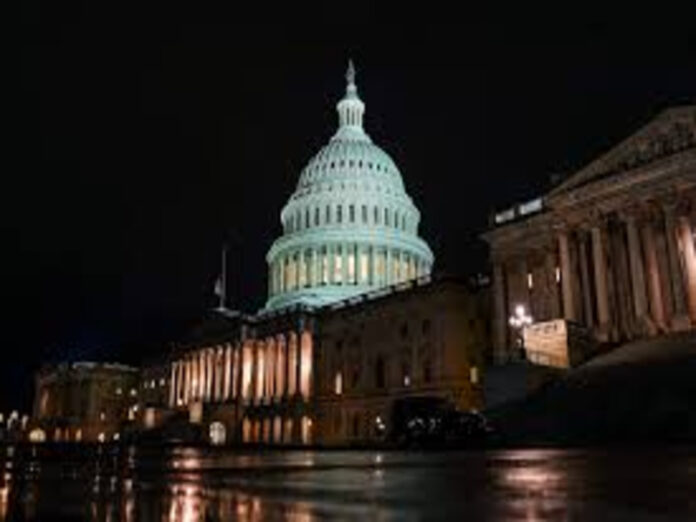Eight Democrats Join Republicans In Late-Night Vote To Reopen Government & Fund Operations Through January 31, 2026
Monday, November 10, 2025, 7:00 A.M. ET. 4 Minute Read, By Jennifer Hodges, Political Editor: Englebrook Independent News,
WASHINGTON, DC.- In a rare late-night session on Sunday, November 9, 2025, the U.S. Senate voted 60–40 to advance a procedural measure to end the ongoing government shutdown, commonly referred to as the “Schumer Shutdown.” The vote, which took place shortly before midnight, saw eight Democratic senators cross party lines to join Republicans in a show of bipartisan resolve aimed at restoring federal operations after nearly three weeks of partial closure.
The continuing resolution (CR), which funds the government through January 31, 2026, includes appropriations for critical agencies, including the Department of Defense, Homeland Security, Health and Human Services, and the Department of Transportation. It also provides temporary extensions for federal nutrition programs, veterans’ benefits, and disaster relief assistance, ensuring essential services remain operational during the holiday season.
The eight Democratic senators who voted with Republicans were: Dick Durbin (D-IL), Jeanne Shaheen (D-NH), Maggie Hassan (D-NH), Angus King (I-ME), who caucuses with Democrats, Tim Kaine (D-VA), John Fetterman (D-PA), Catherine Cortez-Masto (D-NV), and Jacky Rosen (D-NV). Each cited the economic toll of the shutdown and the pressing need to restore pay for furloughed federal workers as reasons for breaking from their party’s leadership.
Senate Majority Leader John Thune (R-SD), who shepherded the bipartisan deal through a divided chamber, praised the outcome but cautioned that additional steps remain before the bill can reach President Trump’s desk.
“This is a strong step toward reopening our government and ensuring Americans aren’t held hostage by partisan brinksmanship,” Thune said following the vote. “We expect to complete the final legislative text in the coming days, but it may not be ready for transmission to the president until the end of the week.”
The procedural vote marks a significant shift in the weeks-long standoff that began after Senate Democrats refused to bring forward a Republican-led funding proposal without assurances of increased domestic spending and pandemic-era tax subsidies for the Affordable Care Act. The deadlock forced tens of thousands of federal workers into unpaid furloughs and disrupted services nationwide.
Republican lawmakers hailed the outcome as a victory for fiscal responsibility, while some Democratic leaders expressed frustration over the defections.
Senate Minority Leader Chuck Schumer (D-NY) defended his opposition to the bill, saying Democrats had offered a reasonable compromise before the vote.
“Yesterday, we offered Republicans a perfectly reasonable compromise to get out of this horrible shutdown that they installed on the American people,” Schumer said Saturday on the Senate floor. “We offered three things: we all vote to reopen the government, we all approve a one-time temporary extension of current ACA premium tax credits, and then after we reopen, we negotiate.”
On Sunday night, as senators prepared to cast their votes, Schumer told reporters he would vote no on advancing the measure, citing the bill’s lack of health care funding and long-term budget reforms.
The funding bill is expected to move quickly through the House this week, where Speaker Mike Johnson (R-LA) has indicated his caucus will “act expeditiously” to ensure the government reopens before the upcoming Thanksgiving recess. President Donald J. Trump is expected to sign the measure once it clears both chambers, according to White House aides.
While the agreement averts an immediate fiscal crisis, it sets up another potential showdown early next year, when lawmakers will once again need to negotiate long-term funding priorities. Both parties have signaled interest in reforming the budget process to prevent future shutdowns, but deep divisions remain over spending levels, border security funding, and entitlement reform.
Editor’s Note:
This report is based on official Senate voting records, statements released by Senate Majority Leader John Thune’s office, and remarks entered into the Congressional Record from November 9, 2025. Senate Minority Leader Chuck Schumer’s quoted remarks are drawn from his floor statement on November 8, 2025, and verified press reports on his position leading into the November 9, 2025, procedural vote. Attribution: U.S. Senate Press Gallery, Congressional Budget Office, and official statements from both Republican and Democratic offices.


